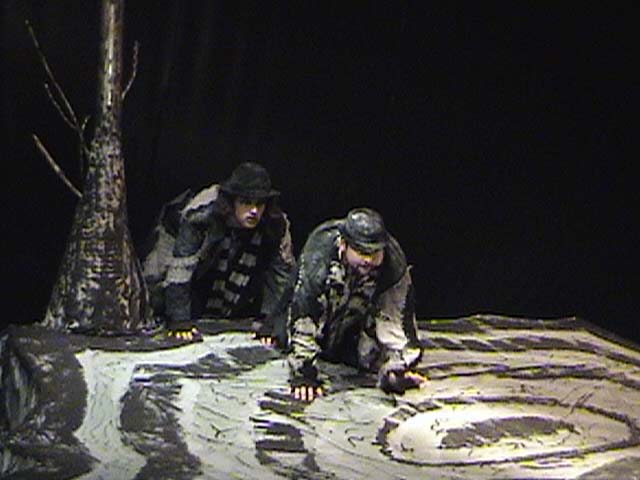The first rehearsal usually consists of a read through of the play, director’s discussion of his/her vision of the play, design presentation, and discussion of administrative matters.
The Read Through -- A read through is exactly what it sounds like. The actors sit down together for the first time and read through the script from start to finish. As stage manager, it is your duty to make sure that everyone has copies of the scripts, and to time the read through. Timing the read through gives you a general idea of the least amount of time the play will run. As blocking and character development occur throughout the rehearsal process, the show’s run time will increase, but the read through’s run time gives you a ball park figure as to what to expect. You may be expected to read the written stage directions during the read through. Check with the director on this point prior to the beginning of this rehearsal.
Design Presentations -- If the designs are completed by the first rehearsal, there may be a design presentation. This is where designers (usually set and costume) display and explain their designs to the actors. These designs may be changed or modified as the play develops in rehearsal, but the presentation gives the actors a good idea of what the over all visual effect of the play will be.
Administrative Matters -- Administrative matters such as rehearsal schedule, are presented to the actors at the first rehearsal. Actors should be handed hardcopies of all information that they will need. Contact lists, rehearsal schedules, fact sheets, shop hour sheet, and any other information you have prepared should be handed out in packets. Shop hour requirements are also explained to the actors. The necessary number of shop hours required from each actor varies depending on student group and production. The actors should be made aware of the production web page (if one exists) and e-mail list, and that they need to notify you as soon as possible if an unexpected conflict arises with the schedule.
The length of the rehearsal phase of production can vary, but is usually six weeks long. By the time you enter the first rehearsal, you should be very familiar with the script, anticipated rehearsal needs, and organizational structure of environment in which you will be working. It is time to begin the process of transforming the play from a written script into a world of living characters.
... Rehearsals usually begin five weeks prior to the first technical rehearsal. During these 5 weeks companies may rehearse a total of 25 hours per week. The customary breakdown is 4 hours per night, Monday-Friday, and one 5-hour rehearsal on either Saturday or Sunday. On the weekend, either Saturday or Sunday will be free. Rehearsal space is booked in advance with priority givento mainstage productions.
The Seven Deadly Sins of Directing
by Scott Crain
Perhaps the first rule of the arts is that artists hate rules. Most of us were originally drawn to the performing arts because we like thinking outside the box; after all, without a pioneer spirit, where would the arts be?
That having been said, however, there is also a very real danger in assuming that the arts should have no rules. The simple fact is that we live in a world fashioned by an orga-nized creator, and everything in life works best when certain guidelines are followed. So, while I’m a huge proponent of “breaking new ground” on stage, there are a few hard and fast rules that I believe every director should follow, not just for the actors’ sake, but for his or her own ultimate good and that of the production as well. What follows is a list of what I consider the seven “deadly sins” of directing, picked up from far wiser directors than myself (and through a lot of personal mistakes):
1) Line readings. At times we may be tempted to say an actor’s line for him or her in a rehearsal, in order to illustrate exactly how we think it should be said. While this may be satisfying to you, it essentially makes the performer feel like a puppet, with the director holding all of the strings. Those lines are not yours (even if you wrote them!), and the moment you start saying the lines for the actors, you are no longer directing, you are dictating.
2) Suggestions between actors. Let actors know at the first rehearsal that there can only be one director, and that they are not to give suggestions to other actors as to how to play their parts. Actors work best when all notes are coming from a single source.
3) Open rehearsals. Allowing spectators to watch rehearsals is asking for trouble. All it takes is a single offhand remark from a family member (i.e., “That other role’s a lot funnier than yours.”) to set an actor back several weeks of rehearsal time in terms of confidence and character development.
4) Carelessness with the actors’ time. Starting late, running overtime (even for a good reason), requiring actors to be at rehearsals at which they aren’t needed, and requiring actors to be at a rehearsal significantly earlier than needed—all demon-strate a lack of planning on your part as well as a lack of consideration for your actors. Their time is important too, and as directors we have to respect it.
5) Scapegoating. Often we’re tempted to blame all of our show’s failings on a single difficult actor. “If only I could have gotten her to work with me, the show would have been a success.” Though this may sound comforting, it’s rarely true. Remember that it is your job to unify the team. Even if there’s a “problem child,” it’s ultimately your responsibility to keep the peace and elicit quality work.
6) Offstage romantic relationships. This may sound juvenile, but theatrical work—particularly youth drama—often puts young single people in emotional situations, which can quickly lead to romance. A wise policy is to not allow actors to date while the production is in progress, to avoid a potential disaster if things don’t work out between Romeo and Juliet.
7) Complaining. There is never enough time, rehearsal, or money—welcome to theatre. Venting your frustration with the lack of resources in front of your cast is simply bad form. In the words of directing guru William Ball, “A professional works with what he is given.” In other words, work miracles with the loaves and two fishes, and perhaps next time you’ll be given more.
You’ll notice that most of the principles above simply boil down to treating your actors with respect and insisting that they do the same with each other—the golden rule in action. This isn’t legalism. In fact, it’s the highest form of freedom—and a principle that Jesus emphasized again and again. The game isn’t made to protect the rules; the rules are made to protect the game. By following these simple guidelines, you can guarantee that your drama team can play inside the lines…while still thinking outside the box.
A Sense of Direction: Some Observations on the Art of Directing" by William BallQuite Specific Media Group, Ltd., 260 Fifth Ave, New York, NY 10001 Copywright, 1984
* Wedding: class project -- finals *
Show Box Score:
Writing: 1-5
Directing: 1-5
Acting: 1-5
Set: 1-5
Costumes: 1-5
Lighting/Sound: 1-5
[ rating online? ]
Dramatic Economy -- JACQUES COPEAU
The Profession of the Director -- LOUIS JOUVET
A Model for Epic Theater -- BERTOLT BRECHT
An Audience of One -- TYRONE GUTHRIE
[ Directors on Directing: A Source Book of the Modern Theater by Helen Krich Chinoy, Toby Cole; Bobbs-Merrill, 1963 ]
2006: Glass Menagerie, scene 7 midterm
Rehearsal units vs. Dramatic Units
Reherasing for Action, for Character, for Message, themes (see Stage page).
...





